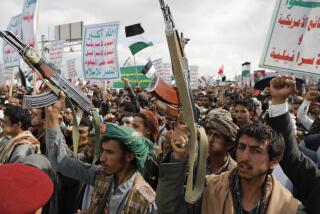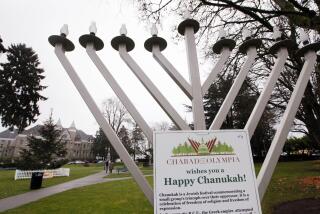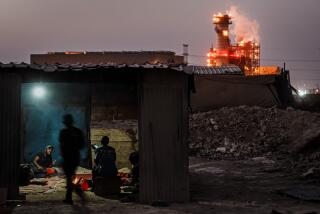21st century Yemenis embrace the ancient power of the tribes
- Share via
SHIBAM-KAWKABAN, YEMEN — The slender, somber-faced 18-year-old wears two crucial tokens tucked against his belly, beneath the embroidered belt. The cellphone links him to the modern world. And the short, curved dagger binds him to the ancient system that is the only thing, he says, that he would die for -- his tribe.
Fouad Hussein is one of a new generation of young Arabs, the vanguard of a massive baby boom. With synthesized Gulf pop in his ears and the Internet at his fingertips, he enjoys access to technology that his parents could probably never have imagined. But from the moment dawn sears the dusty hills until the last wash of sunlight fades over his mud and brick house, Hussein’s life is ruled by the codes hammered out by his ancestors.
“I serve my tribe in everything they ask,” Hussein said, blinking seriously in the brilliant morning sunlight. “If I’m alone, it means I’m weak. If I’m with the tribe, it means I have some power, I am strong.”
Tribal connections will decide Hussein’s job opportunities, his marriage, how much of his salary he can keep, whose wedding party he will pay to host, whether he will have to risk his life fighting over tribal grievances.
Pervasive and often overlooked by outsiders, the ancient network of tribes remains one of the most potent forces in the Middle East. The tribes are older than the nations and borders that carve up the Arab world, older than the oil industry, older than the governments in the United States or Europe. They are an older -- and, some believe, an even stronger -- social force than Islam.
Rather than withering away as the Arab world succumbs to modernity, tribes are only getting more powerful. Weak central governments, civil war in Iraq, an identity crisis born of the clash between modernity and tradition -- all of these factors have fortified the role of the tribes.
‘You need weapons’
But in the clanging streets of the capital, Sana, there is a growing debate about the role of Yemen’s tribes. In some quarters, tribalism is blamed for holding the country back, crippling development and disrupting the nation’s ability to be taken seriously by the rest of the world. To many Yemenis who’d like to see their country evolve into a place with robust civil society and strong institutions, the power wielded by the tribes is too heavy.
Even within the tribal leadership, some sheiks acknowledge reservations about the role of clans. But they say they don’t see an alternative to operating within an entrenched tribal system.
“The culture of the elite, the people on top, is of tribes,” said Ali Imrani, a Yemeni lawmaker and tribal leader. “You need weapons. You need maneuvers to show force. Even here, in the halls of government, people like to show that they could kill each other.”
And that culture, he said, has only gotten stronger.
“During the late 1970s, I never went out of the house in Sana with a knife or traditional clothes,” the lawmaker said. “At that time we had a dream to modernize the country. But now my children, they chose to wear their traditional clothes, to have knives and weapons.”
Talking to young Hussein about tribalism is like talking to him about air. The tribe is engrained in his life; he wastes no time pondering the contours of its influence.
Here in Shibam-Kawkaban, the streets are slow, the landscape spindly and sun-baked, the air pungent with rot, soap and spice. Men in tunics wander home from the market, live chickens thrashing to escape rough hands. Women shuffle down the roads quickly, only their eyes visible between layers of heavy fabric.
Hussein leans against his family’s Besta van, his bony fingers wrapped around the shaft of his dagger. It’s a school day, but he often skips class to make a little extra money with the van, ferrying villagers back home to remote farmhouses with their purchases. They pay about $2 a head and clamber aboard, balancing loads of fresh vegetables and hunks of sticky dates in their laps. Hussein is proud of the van: The seats are covered in dingy red cloth; a hank of fur adorns the dashboard.
Marriage plans
Hussein’s mind is flooded this morning with thoughts about his upcoming marriage. He is trying to decide which girl he should ask his parents to seek out. Then his parents will go to her house, try to negotiate a match, woo the family with gold jewelry and sweets. Perhaps his sisters will contrive to get a glance at her face, and will tell him whether she is pretty.
He needs all the money he can get. He dreams of moving out of his parents’ home once he gets married, although it won’t be easy. He imagines finding a job in the big city one day, in Sana.
“The only work available is in the shops. There are no public service jobs,” he said. “We’ve lived here forever. It’s our village. But I don’t like my father’s job. I’d like to have a different job. There isn’t enough money in it.”
A few months ago, his tribe called upon him to fight for the first time. A neighboring tribe was digging a water well too close, threatening the water supply. Negotiation failed. Hussein took his rifle and joined the other men as they took up positions along the borderline between the two tribes. If they saw any motion in the direction of the disputed wells, they shot.
Ask him about it now, and he shrugs. “I didn’t kill anybody,” he says impassively.
After two days of gun battles, the tribes reached an agreement.
In a sense, tribes are the tendons that hold the nation together. By co-opting tribal sheiks, the regime in Sana is able to shore up its proxy hold on this sprawling country, employing friendly tribesmen as extra-military soldiers and bringing sheiks to Sana as members of parliament.
“If there is real development, if there is real modernization in society, then we can talk about the destruction of the power of the tribes,” said Abdullah Azzalab, director of the Public Corp. for Radio and Television in Sana. “But with our problems, with our poverty, the tribal system is still a very important party that can take the hand of the state in moments of crisis.”
Growing resentment
Other Yemenis think that logic is backward -- that Yemen can progress only with weakened tribes.
“Tribal areas with a strong sheik can get anything they want from the government,” griped Shaoqi Kadi, a lawmaker from Taizz who is critical of tribal influence. “They can get recruitment for the people, jobs for the people, scholarships to study abroad.”
Kadi shucked his sports coat as he started talking about tribes, muttering, “This subject makes me hot.” Then he settled back, and began to rattle off some of the tribal abuses he has documented.
A tribal sheik, whose home turf lies outside the reach of the central government, has his own prison. He punishes and banishes people with impunity. When elections came, he ordered the curtains removed from the booths to intimidate voters into reelecting him.
Police, in their seemingly fruitless efforts to get people to stop toting automatic weapons in the streets of the capital, stopped a sheik and his bodyguards for carrying guns. A fight erupted; one bodyguard was killed. The sheik, in a rage, threatened to kill every police officer in the city. In the end, the Interior Ministry offered to turn the killer over to the tribe to be punished according to tribal whim.
“A lot of young people may be using Internet or mobile telephones, but if they face any dispute or problem, they’ll go straight to their tribe and ask protection,” Kadi said. “They’ll take off their neckties and wear a dagger.”
More to Read
Sign up for Essential California
The most important California stories and recommendations in your inbox every morning.
You may occasionally receive promotional content from the Los Angeles Times.










